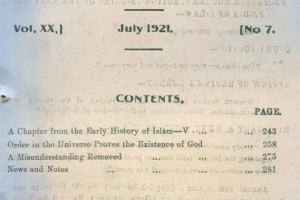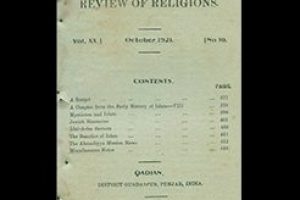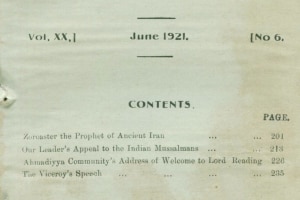
Professor Amtul Razzaq Carmichael and Imam Mansoor Malik, UK
A Chapter from the Early History of Islam, II
(The Beginning of Dissensions)
The first article of the March issue was a continuation of the translation of an address given by His Holiness, Hazrat Mirza Bashir-ud-Din Mahmud Ahmad (ra), second Successor of the Promised Messiah (as), to the Martin Historical Society at the Islamia College Hall Lahore on 26th February 1919. It was an extremely significant lecture because it dealt with a particularly important era in the history of Islam. This address eloquently explained the causes of conflict and dissension amongst early Muslims. Hazrat Mirza Bashir-ud-Din Mahmud Ahmad (ra) provided a correct and accurate historical account of the conflicts which arose amongst early Muslims after the demise of the Holy Prophet (sa). Hazrat Mirza Bashir-ud-Din Mahmud Ahmad (ra) refuted various allegations levelled against the person of Hazrat Uthman (ra) and his companions. Some historians have claimed that conflicts of early Islam were the results of an alleged incompetence of Hazrat Uthman (ra) while others have claimed this to have been the result of a bitter power struggle between various companions of the Holy Prophet (sa). In this lecture, His Holiness (ra) countered both these notions with clear evidence and clarified that conflicts arose due to the conspiracies of the enemies of Islam. This lecture is now available in a book form. [1]
A Pathetic Scene at Medina
(Sheikh Ghulam Farid, B.A.)
The author presents the account of a man approaching the Holy Prophet (sa) and requesting him to wash him clear of his sin as he had committed fornication. The Holy Prophet (sa) turned away four times, yet, on each occasion, the man returned with the Prophet of Islam (sa) and reiterated what he had done. Following this, the Holy Prophet (sa) inquired of him whether he was mad or drunk, but the man once again repeated the sin he had committed, upon which the Holy Prophet (sa) ordered for the execution of the man.
Instead of delving into the topic of the authenticity of the narration, or when exactly during the ministry of the Holy Prophet (sa) this event took place, the author, rather interestingly, raises the question as to why this man was prepared to face death? Through this event, the author highlights the magnificent transformation that took place within the ‘savage sons of the desert.’ The author depicts their initial state in the following words, ‘They knew no God, no Prophet and no Law. They worshipped idols and images and followed the dictates of their depraved conscience. Wine and women were the two things they loved most.’
The advent of the Holy Prophet (sa) brought about within them such a magnificent transformation, which stands unrivalled in the history of mankind. The author depicts this in the following manner: ‘They who knew no God and no religion became so firm of faith and character that no persecution, however strong, no force, however violent, no earthly allurement, no worldly longing and no persuasion could stand in their way…They who vied with Satan in vice and were devils incarnate began to challenge angels in piety and godliness. They who were not thought fit to make good subjects became the conquerors and rulers of the whole world.’

The Promised Messiah (as), Imam Mahdi (Guided One), Hazrat Mirza Ghulam Ahmad (as)
The author presented various couplets of the Promised Messiah (as) depicting this extraordinary transformation and for the sake of blessings, their translation has been given below.
The wise chose your company and followed you;
And the truthful relinquished their hearths and homes to be with you.
They chose you, and abandoned their friends;
They distanced themselves from their families.
They bid farewell to their base desires, and self-indulgence;
They discarded all their material belongings.
They became enlightened in the pitch darkness of night;
And Allah saved them from being engulfed in a raging storm of torment.
The despicable and accursed of the earth looted all their belongings;
But their faces gleamed upon receiving the pearls of the Qur’an.
They thoroughly cleansed their souls of all impurities;
And moved forward to gain the wealth of unflinching faith.
The blood of sincere lovers was shed under the sword;
Like the blood of sacrificed animals flowing under the knife,
They abandoned the pleasures of the evening wine;
And embraced the joy of prayers in nights of grief. [2]
A Day at Qadian
(P. B.)

Minarat-ul-Masih – The white minaret in Qadian, India, symbolic of the advent of Hadhrat Mirza Ghulam Ahmad (as), the Promised Messiah and Imam Mahdi
The author of this piece, a non-Ahmadi Muslim, produces an interesting account of his visit to Qadian and the personal encounters and experiences he had.
The first thing that caught his attention was the manner in which people from all over the world travelled to Qadian. The author expresses his astonishment at the fact that despite the poor condition of the road, ‘…a pilgrim makes his way through mountains of dust with great pleasure.’
The friendliness and hospitality of the inhabitants of Qadian left a lasting impression on him. Everyone greeted him with Assalamu Alaikum [may peace be upon you] and welcomed him into their homes with open arms and radiant faces.
Apart from seeing the various places in Qadian, such as the Madrassa Ahmadiyya with its beautiful surroundings and a rather developed science department, as well as the Minarat-ul-Masih, the author also had the honour of having an audience with the then Head of the Community, Hazrat Mirza Bashir-ud-Din Mahmood Ahmad, Khalifat-ul-Masih II (ra).

Hazrat Mirza Bashir-ud-Din Mahmood Ahmad (ra) (also known as Hazrat Musleh-e-Maud), the second successor of the Promised Messiah (as), and Worldwide Head of the Ahmadiyya Muslim Community from 1914-1965.
© Makhzan-e-Tasaweer
Giving a brief account of this encounter, the author says, ‘Seated on a small piece of carpet, dressed in a neat and simple dress with his head bent and eyes half closed, I saw the present leader of the movement. After the mutual greetings he lifted up his majestic head and I saw the pleasant and prophet-like face. There was a sympathetic thrill in his voice and the words gushed out like pure water from the fountain of his soul.
He was meek like a lamb, innocent as a babe but wiser than an old man of eighty. His very words brought peace with them and they healed the wounds of irreligiousness like an ointment.’
The author also noted the help the community was rendering to the needy and he expressed his pleasure at witnessing their ever-helping spirit.
Why is All this Tribulation?
Having just lived through World War One, the author draws the attention of the reader to the destruction it caused to people and nations. Stating that this was not all the world was facing at that time, the author goes on to say, ‘…in other countries of the world, plague, pestilence and various other disastrous and fatal diseases have long worked havoc by carrying away millions of human beings. Frequent shocks of ruinous earthquakes have shaken the earth to its very foundations. Direful floods and tornadoes have caused famines of awful nature. There are disorders and disturbances on all sides and the whole world is passing through a tribulation the like of which it has never seen before. Does not all this call for an explanation?’
The subject of trials and tribulations is many a time connected to the topic of the existence of God. The author, however, does not directly deal with this topic as such, but reminds the reader, ‘It has been an immutable law of God from times immemorial that whenever men fall a prey to sin and iniquity, whenever men sink into the depths of moral degradation, whenever they are involved in the cimmerian darkness of irreligion, whenever they are plagued into the crassest ignorance and whenever they forsake God and give themselves up to worldly pleasures, God raises a prophet.’ These prophets serve as guiding lights, dispelling the darkness around people and leading them towards morality, spirituality, and God.
After stating various examples of the past, such as Pharaoh and his followers and the people of Noah, the author presents the following verse in support of his argument that trials and tribulations are a sign of the recent advent of a prophet of God. Allah the Exalted states in the Holy Qur’an, ‘And never did We send a Prophet to any town but We seized the people thereof with adversity and suffering, that they might become humble.’ [3]
Turning once again to the dire spiritual state of the time, the author urges the reader to reflect on the current state and consider whether God would violate His unchangeable law and forsake the world by not sending a warner? Certainly not! He did send a warner, Ahmad (as) of Qadian, the Promised Messiah and Reformer of the age. To close the article, the author presented extracts of prophecies made by the Promised Messiah (as) regarding the trials and tribulations the world would face following his advent and as a result of forsaking God and whole-heartedly inclining towards the world, which have since been fulfilled and are continuing to be fulfilled to this day.
News and Notes
- Hazrat Mirza Bashir-ud-Din Mahmood Ahmad (ra), Khalifat-ul-Masih II, travelled to Lahore and delivered a lecture on the need of religion. He also travelled to Malerkotla and delivered a lecture on the truth of Islam.
- Two missionaries of the Ahmadiyya Muslim Community, Maulvi F. M. Sayal and Maulvi Mubarak Ali Sahib, are serving tirelessly in London for the progress of the community. Two new conversions were reported, and 13 lectures were delivered within a period of three weeks.
- Mr Nayyar departed for Sierra Leone in February and before doing so, he gave a much appreciated lecture at the Independent Spiritualist Church of Portsmouth.
- Following a lecture delivered in a church in America, a gentleman stood up and confessed that they considered the East to be uncultured and uneducated. Yet, they were now provided with a missionary from the East to cure their spiritual blindness.
- The Lincoln Jefferson University in America conferred upon Mufti Muhammad Sadiq Sahib the honorary degree of Doctor of Literature in recognition of his attainment as a scholar, success as a leader, and devotion to promoting the higher and nobler relations between mankind.
- The late M. Clemenceau, former Prime Minister of France, recently made the following statement at Bombay that the ideals of love and humanity came from the East and that he was not speaking to the audience as someone belonging to a higher civilisation, but as one swimming to its source.
- Recently, a mysterious disease called ‘Sleepy Hiccoughs’ appeared in Paris, resembling the beginning of the Spanish flu. Cases were emerging in England, Switzerland and Montreal. Despite all kinds of experiments, medical experts were unable to define the cause or offer a cure.
- An estimated 7 million people in British India alone fell prey to this mysterious disease.
- China was facing wide-spread famine, impacting more than 20 million people. This caused great suffering and resulted in enormous losses of life. Appeals were made globally to assist and donate towards the famine.
- According to a Reuter’s report, the waters surrounding the British Isles were graves for 41,000 seamen who lost their lives during the war. Apart from this, more than 9,000 vessels were sunk due to enemy action.
- The sad plight of the Mullahs [religious clerics] of the present day was highlighted during an incident and altercation near the Juma Mosque in Delhi. A quarrel on religious injunctions broke out between two parties, leading to a physical altercation, resulting in two deaths and leaving several injured.
- The emergence of this disease, the famine and the wide-spread trials and tribulations across the world, both physically and spiritually, were attributed by the author of this section to the prophecies made by the Promised Messiah (as) in which he repeatedly stated that as a result of rejecting his claim and turning away from God, trials, tribulations and new kinds of pestilences would appear and strike terror into the hearts of people and would bring about a terrible shaking over men, trees and the seas.
ENDNOTES




Add Comment